Reply To:
Name - Reply Comment
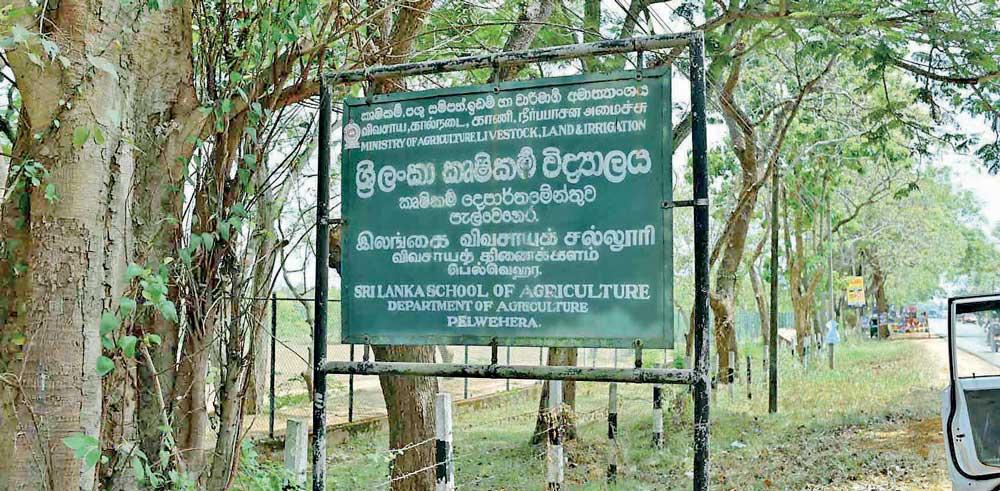
The billboard that indicates the presence of the school of agriculture
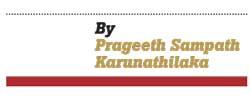 Sri Lanka School of Agriculture, located in Pelwehera, Dambulla, started around 1980. This school of agriculture has made significant contributions to the advancement of the agricultural sector in the country. Established under the Department of Agriculture Sri Lanka, the school had its first intake of students (numbering 50) for a residential course in the year1980. There are concerns that this academic institute will be sold to a private company, which plans to take it over and offer education courses for a fee.
Sri Lanka School of Agriculture, located in Pelwehera, Dambulla, started around 1980. This school of agriculture has made significant contributions to the advancement of the agricultural sector in the country. Established under the Department of Agriculture Sri Lanka, the school had its first intake of students (numbering 50) for a residential course in the year1980. There are concerns that this academic institute will be sold to a private company, which plans to take it over and offer education courses for a fee.
 On February 13, 1882, the British rulers established the Department of Agriculture. The Department of Agriculture Sri Lanka was officially formed on 20 May 1912. This was 30 years after the initial establishment of an agriculture department in the country. Before establishing the department, the British assessed its suitability for 11 years. Former Director of Agriculture K.B. Gunaratne said that the Department of Agriculture Sri Lanka was established with the hope of fostering innovation in the country’s agriculture.
On February 13, 1882, the British rulers established the Department of Agriculture. The Department of Agriculture Sri Lanka was officially formed on 20 May 1912. This was 30 years after the initial establishment of an agriculture department in the country. Before establishing the department, the British assessed its suitability for 11 years. Former Director of Agriculture K.B. Gunaratne said that the Department of Agriculture Sri Lanka was established with the hope of fostering innovation in the country’s agriculture.
To establish proper agriculture education in Sri Lanka, on January 15, 1916, Sir Anton Bertram, then Attorney General, initiated the establishment of a School of Tropical Agriculture. It was located on the premises of the In-Service Training Institute located in Gannoruwa. Initially, the college enrolled 72 students, with 66 educated in English and 6 in the vernacular. Among its alumni was the first Prime Minister of the country, D.S. Senanayake, who made significant contributions to Sri Lanka’s agriculture sector. According to Gunaratne, plans were made to establish similar agricultural schools nationwide.
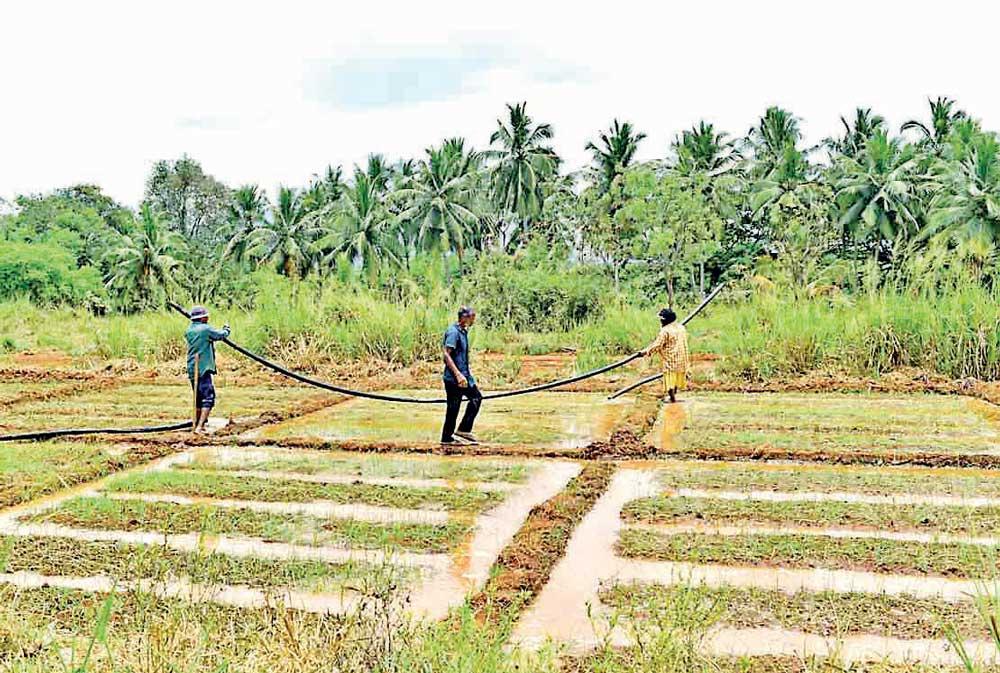
A pady field is maintained at the premises
Accordingly, agricultural schools were established in Jaffna on September 28, 1924, in Labuduwa in the southern part in 1929, and in the Wagolla and Karadin Aru regions in 1957. Additionally, agriculture schools were set up in Horana, Walpita, Ambepussa and Thabbowa areas offering students the opportunity to follow diploma courses in agriculture. These institutions conducted a three-year diploma course and a one-year certificate course in agriculture. Graduates from these courses were later appointed to prominent positions in the country’s agricultural sector. Furthermore, students who completed the agriculture diploma from these schools joined the Department of Agriculture as middle-level technical officers. Moreover, agricultural schools were established in Kundasale, Agunakolapalassa and Pelwehera. It is worth noting that students in these schools received diplomas in agriculture and certificates free of charge. According to Gunaratne, the government allocated funds for this purpose. This agricultural education system greatly benefited students, who could not gain university admission after completion of the Advanced Level Examination.
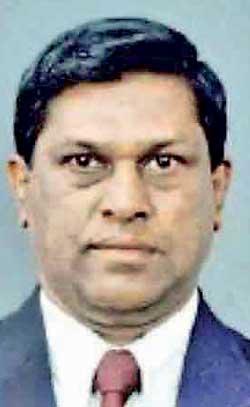
“There are reports that the private company plans to convert this agricultural school into an educational institute offering agriculture diplomas and NVQ courses and charge fees from students”
K.B. Gunaratne Former Director of Agriculture
|
Agriculture photos\A.M.S.K Adhikari |
According to Gunaratne, the Dambulla Pelwehera Agricultural School, established on January 26, 1980, has played a crucial role in helping students from Anuradhapura, Polonnaruwa, Matale, Kandy, Kurunegala, and other areas who have completed their Advanced Level Examinations, but did not qualify for university admission to enhance their futures. One of the primary goals in establishing the Pelwehera Agricultural School was to contribute to the social and economic development of the farming community. An accomplishment of the Pelwehera Sri Lanka School of Agriculture is that it has produced about 100 Agriculture Diploma holders skilled in crop production, horticulture, animal husbandry, agricultural engineering, food science and technology, plant conservation, farm management, agricultural sales and marketing management. Since 1998, the school has been registered with the Tertiary and Vocational Education Commission as a recognised training institution in Sri Lanka. Gunaratne also added that the school has introduced the National Vocational Qualification (NVQ) System for the Higher National Diploma in Agricultural Production Technology.
So far, the school has been registered with the Tertiary and Vocational Education Commission and has begun offering NVQ 5 and 6 courses. Students who pursued A’ Levels in the physics, agriculture and technology streams, but did not secure university admission are educated in English at this agricultural school. Students studying Animal Husbandry and Agricultural Science and pursuing a two-year course receive comprehensive training; the training includes six months of institutional training supervised by the NAITA Institute. They are subsequently awarded NVQ 5 and 6 certificates by the tertiary education institution. According to Gunaratne, approximately 1500 agricultural scholars have graduated from the Pelwehera School of Agriculture and now hold prominent positions in the agricultural sector.
Alarming news of a transfer
However Gunaratne added that the current situation this agricultural school faces is quite alarming. He highlighted that this is due to efforts by some individuals within the Ministry of Agriculture to transfer 68 acres of land belonging to the college to a private company. Gunaratne said, “There are reports that the private company plans to convert this agricultural school into an educational institute offering agriculture diplomas and NVQ courses and charge fees from students”.
|
A place at the school where activities of bees are supervised |
As a result of the COVID-19 epidemic and economic crisis, educational activities at this school were temporarily suspended. Meanwhile, a private company eager to acquire the land has begun operations. Gunaratne stated that the company claims the Pelwehera Agriculture School is inactive and is attempting to acquire the college’s approximately 68 acres of land.
A portion of the land owned by this agricultural school was previously allocated to a private company. Subsequently, the total land area of the School of Agriculture was 88 acres, out of which around 20 acres were leased again to Kandalama Hotel for a green agricultural plantation under a thirty-year lease agreement. Gunaratne added that the management of this land falls under the supervision of the Dambulla Divisional Secretary.
An anniversary celebration was held at this school last April. Gunaratne noted that it is noteworthy that a financial contribution for the event was provided by the company wishing to acquire the school. He also raised serious concerns about whether these transactions have influenced various news media reports; suggesting that there are questions raised about the school using the aforementioned land.
Meanwhile, this agriculture school hasn’t been provided with the necessary facilities for an extended period. Requests to fill employee vacancies and expand NVQ courses have been rejected by higher authorities. Existing staff members are often required to take on multiple roles. Even hiring retirees on a contract basis hasn’t sufficed to manage the workload of the school. Gunaratne underscored a significant concern regarding these employee issues. He said that they may not be addressed because the intention could be to sell the school and its land to a private company.
“I cannot reveal information regarding decisions made at the ministry level”-Adhikari
“This newspaper questioned A.M.S.K. Adhikari, Deputy Director of Pelwehera Agriculture School, regarding this issue. She mentioned that the land belonging to the school spans approximately 68 acres. She added that she was unaware of any plans to transfer this land to a private company. Adhikari stated, “I cannot reveal information regarding decisions made at the ministry level. Currently, Pelwehera Agriculture School has 68 acres. It accommodates students pursuing NVQ and agriculture diploma courses in subjects like engineering, animal husbandry and agriculture courses under adequate facilities”. Additionally, she underscored the presence of a staff shortage at the institution. She noted that requests to address this shortfall have been made to the Department of Agriculture.
There is information indicating that this transaction is gaining support from the Department of Agriculture in Anuradhapura, as well as some individuals within the Ministry of Agriculture. These individuals are attempting to sell the agricultural education institute, which provides free education for children aspiring to become agricultural scholars. It is understood that there is even a plan to draft a cabinet paper for this purpose. In a country where the agriculture minister merely boasts to the media about progress in agricultural, it is no surprise that an educational institution like this is being considered for sale. The Agriculture Minister claims that the country achieves self-sufficiency in rice during the paddy harvesting season and in vegetables when they are available and promises not to import such produce for a year. Yet, he is attempting to sell the Pelwehera School of Agriculture, where students can learn. Gunaratne pointed out that if this is true, the authorities should pay attention to this matter.
“This land will not be allocated to any party”-Ranatunga
This newspaper also spoke with Kamani Ranatunga, Director General of the Department of Agriculture, regarding this matter.
She said, “Currently, we don’t have 68 acres in Pelwehera. We only have about forty acres, with the remaining land allocated to the private sector. The School of Agriculture and the Seed and Planting Material Office operate on the land available. The school doesn’t have 68 acres, and it is operational and will not be transferred to anyone. Despite long-standing interest shown by a private company, this land will not be allocated to any party”.
The government is making a grave error by handing over an institution to the private sector that produces agricultural officers who are vital for the country. A recognised NVQ diploma from a government institution holds global value. Gunaratne questioned whether dismantling such a government educational institution and transferring it to the private sector is a deliberate move to undermine agriculture.
Commenting on this, Dambulla Divisional Secretary Piyal Jayasuriya said that about 20 acres of this land has been given to Kandalama Hotel. According to him, it was to start green cultivation. He had observed that green cultivation activities were going on in that land. The Divisional Secretary added that the acreage has been handed over to the Land Commissioner and given away on a thirty-year lease basis and that the company that owns the hotel is paying the lease on the land properly.
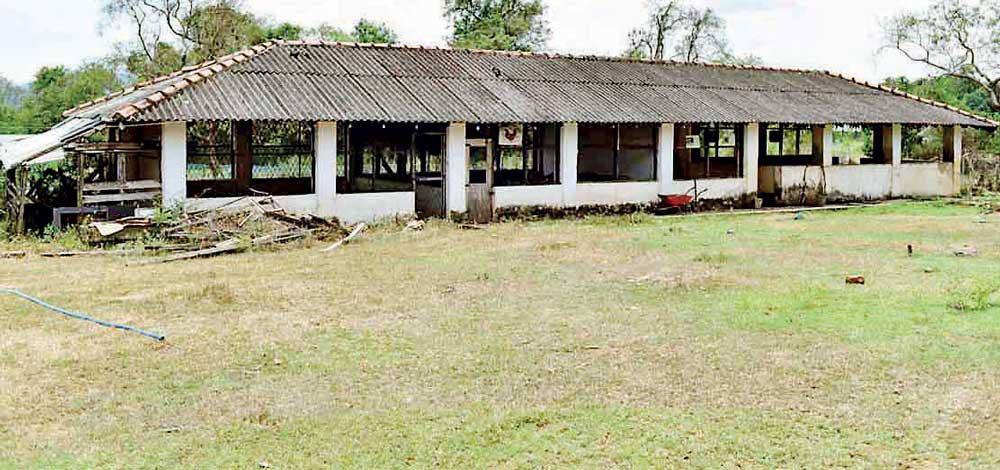
The building where animals are housed
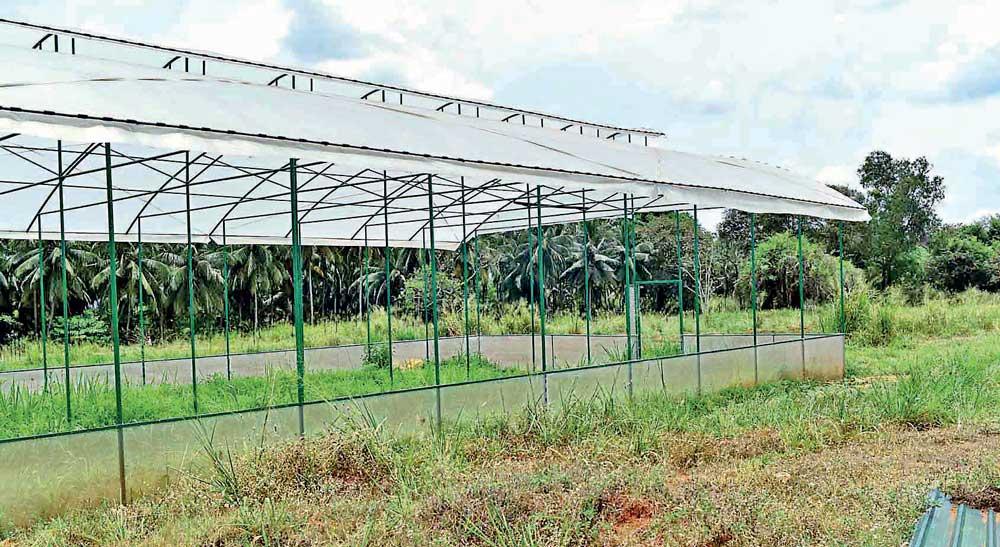
A nursary being maintained
This writer also sought clarification from Mahinda Amaraweera, the Minister of Agriculture. However, his security unit informed this scribe that he was at a meeting and unavailable for comment. Multiple attempts made to reach him by phone proved futile. The Minister retains the opportunity to respond to this newspaper article.